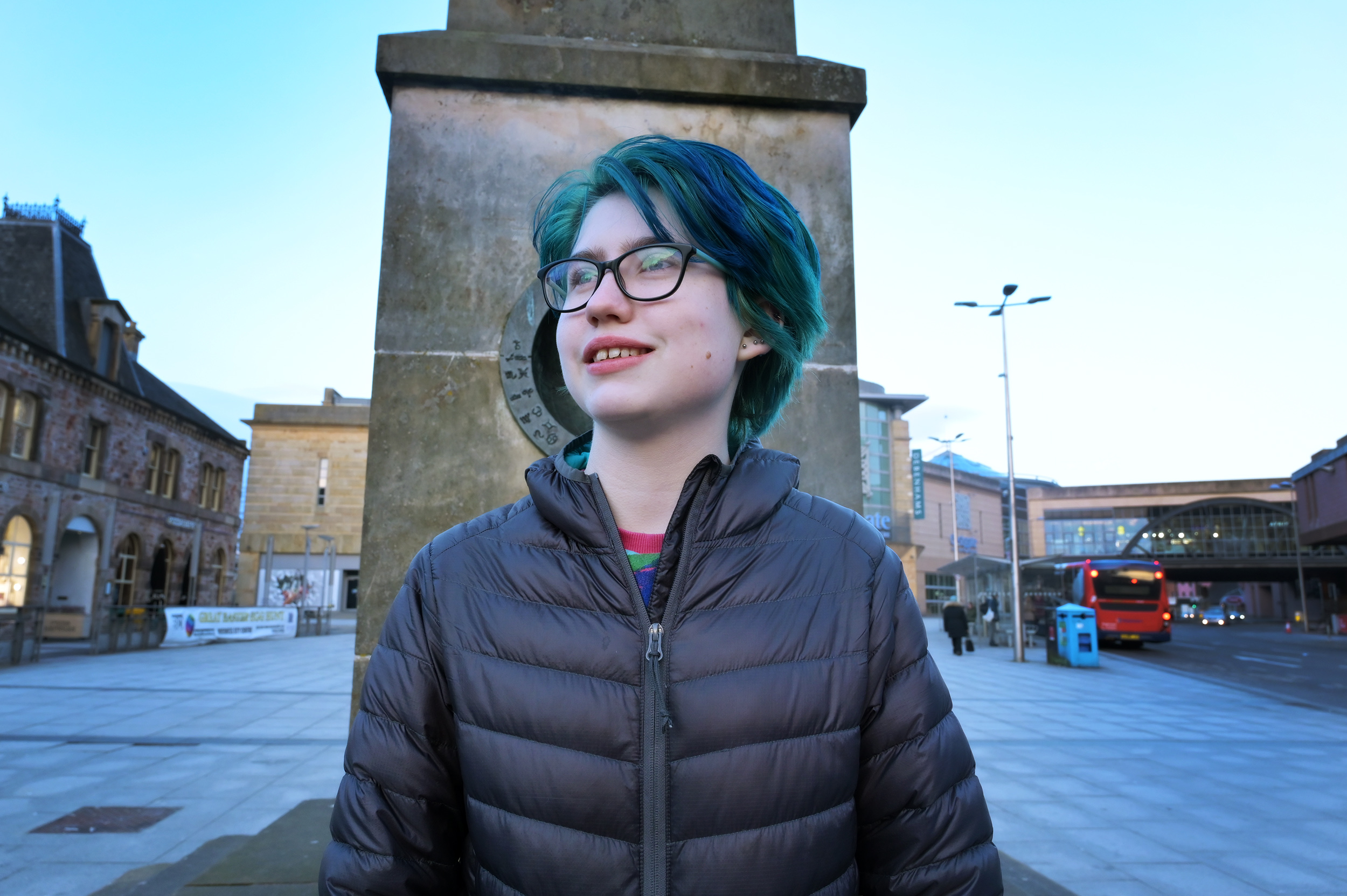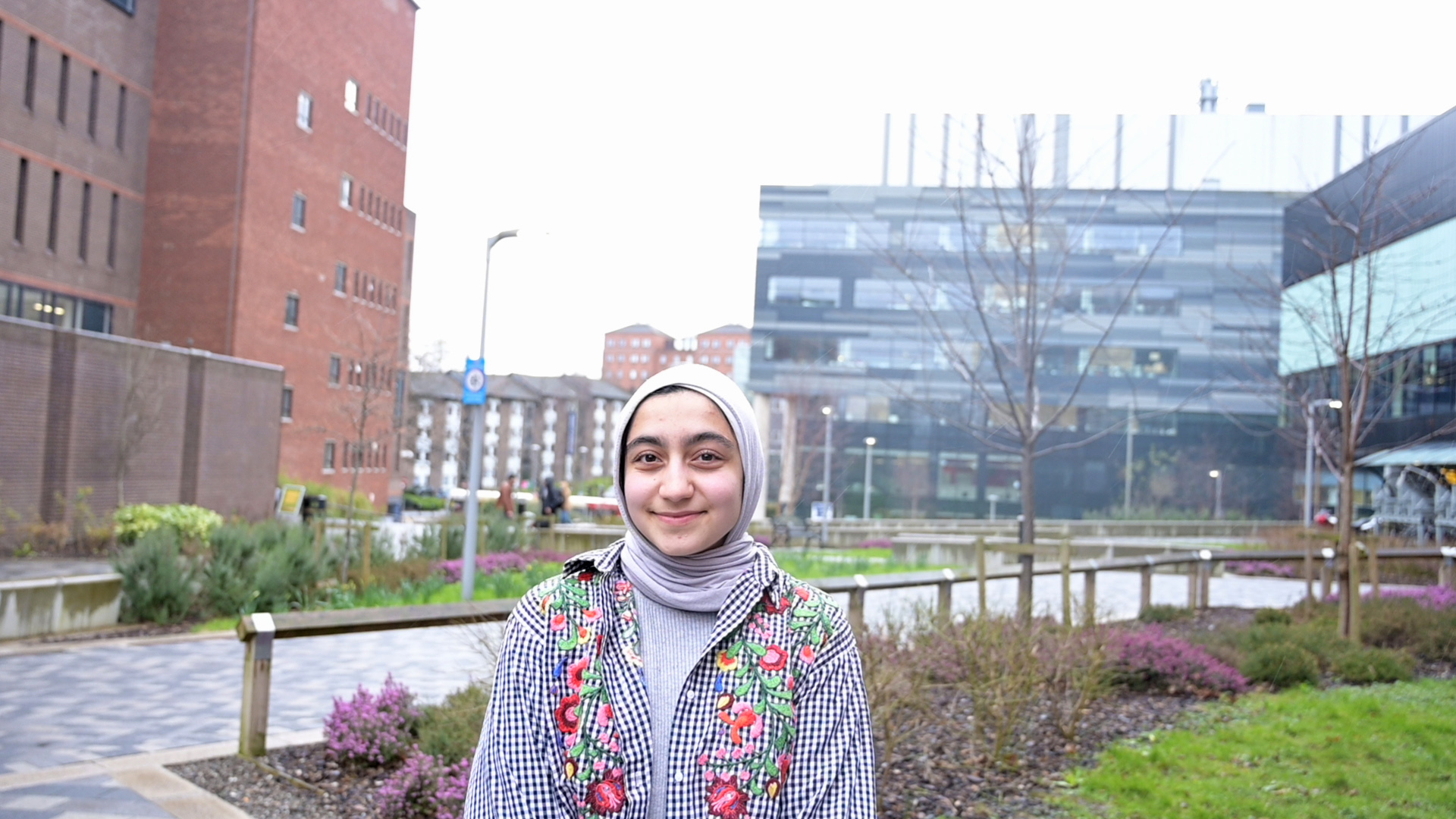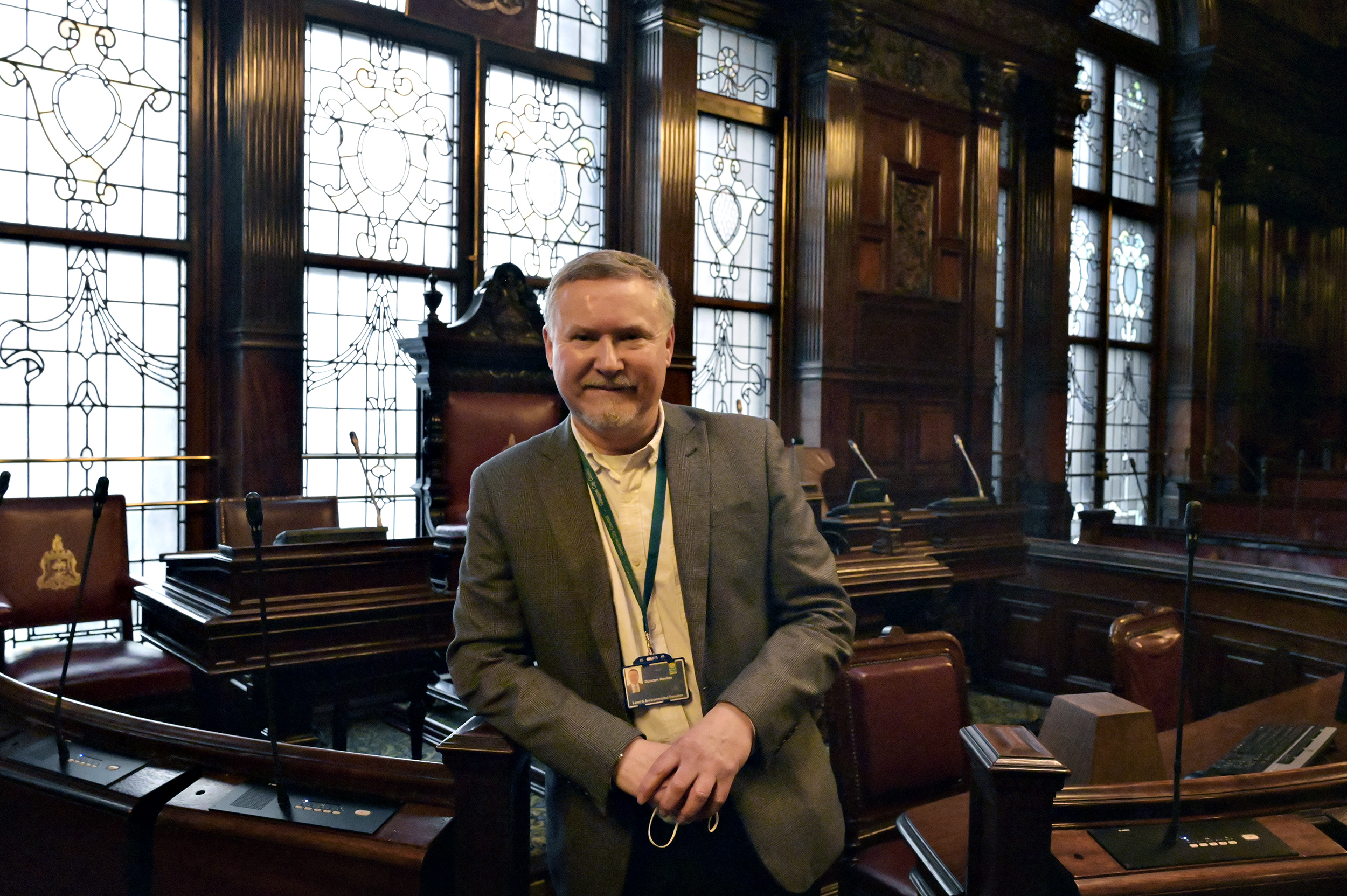We're going to keep being annoying
by Ava Leone
Marching from Columbia Park to Glasgow’s City Council Chambers in George Square, 17-year-old Lily Henderson helped lead 40,000 people from across the world in a rally to fight for climate justice on Friday, Nov. 5, 2021.
Henderson, with her short, boyish, blue-green dyed hair, square glasses and a gap-toothed grin, skipped her high school classes to join fellow protesters waving colorful flags and posters amid the skyscrapers in the city, shouting for the world to stop what they referred to as climate crime.
Acclaimed activists Greta Thunberg, the 19-year-old Swedish environmental activist who single-handedly spearheaded the school climate strike movement, and Vanessa Nakate, a 25-year-old Ugandan climate justice activist who spurred youth climate strikes in Africa through her own solo protests outside the Ugandan Parliament’s gates, strode alongside the group.
“That was quite a powerful moment being there, surrounded by all these amazing activists and people showing the politicians in the rooms that we’re here — we’re not going away,” Henderson said. “We’re going to keep being annoying.”

COP26 — the 26th ‘Conference of the Parties’ — the 2021 United Nations climate change conference brought together world leaders, government representatives, businesses and citizens for 12 days of talks and negotiations about how to tackle climate change.
While COP26 focused the eyes of the world on environmental issues, activists like Thunberg and Henderson said they never expected a mere gathering of politicians to lead to immediate results. Nevertheless, they came away from the conference convinced that their generation of climate activists and allies of the youth movement will be unrelenting in their demand for policy changes.
“It is not a secret that COP26 is a failure,” Thunberg said to the mass rally during the conference. “It should be obvious that we cannot solve a crisis with the same methods that got us into it in the first place.”
Many activists left COP26 unsatisfied and stressed about the lack of concrete decision-making and what it could mean for the world’s future.
After the days of negotiations ended, the summit failed to renew targets for 2030 to decrease global warming to 1.5 degrees celsius or to get all 197 countries to sign off on “phasing out” coal in their industries.
“I would say I was disappointed, but I went in expecting to be disappointed. It’s politicians we’re talking about here. We didn’t expect greatness to come out of it,” Henderson said.
At 14, Henderson started getting involved with environmental activism when she attended a climate strike in her hometown, Inverness, located in the rural Highlands.
She signed up to join the Fridays for Future team in Inverness, an international movement started by Thunberg, in which students skip Friday classes to participate in protests, demanding action from political leaders to stop climate change. Eventually, Henderson’s activism spiraled from the local level to the national level and all the way up to the international level at COP26.
Henderson said politicians used the summit to cement their own relationships and connections in the public eye. One viral photo of Scotland’s First Minister Nicola Sturgeon giving United States House Representative Alexandria Ocasio-Cortez a can of Irn Bru, a popular Scottish soft drink, caught Henderson’s attention.
“That was a nice little moment to see that….But if you really look into it, that’s got nothing to do with climate change,” Henderson said. “It’s just about her [Sturgeon] increasing her status and her relationships with politicians across the globe. And that’s got nothing to do with what we are here to do.”
Her frustration is shared by other young Scottish activists, like 18-year-old Sarra Wassu, who devoted their time to trying to get negotiators at the summit to listen to them.
“It seems like it’s a game for people in power. It’s just like a game…The biggest joke was how much carbon was emitted from private jets…,” Wassu said, citing British Prime Minister Boris Johnson as an example. “He’s in England and he could have easily got on a train. But no — a private jet was needed.”
A first-year student studying medicine at the University of Glasgow, Wassu started getting involved with activism when her mom dragged her to volunteer with an environmental organization when she was just 3 years old.

Looking up to her mother as a role model, the only person of color in the organization at the time, the experience sparked Wassu’s passion for protecting the planet.
“I started to just find this interest and love for nature and the world around us. And from then on, one thing led to another,” Wassu said. “And I just realized, I love the life that I’m living, I love nature, I love different parts of the world. I just want it to stay forever. That’s how I got involved with climate action and climate justice.”
Wassu volunteers with the John Muir Trust, a Scottish charity that conserves wild land for the public, and the Scottish Forestry, a government agency responsible for forestry policy.
She believes it’s important for young people to get involved with environmental activism and to educate themselves, because “knowledge is power.” And in five to 10 years, they will be the people making decisions about how to tackle global warming.
Taking part in protests fuels Wassu’s determination.
“There’s almost this feeling of strength when people come together for the same reason,” Wassu said. “So I just find a fire in being able to take part in direct action, and to show myself to people in power, who are not doing the right thing — they’re only doing the thing that benefits them the most.”
However, after participating in rallies during COP26, Wassu walked away feeling disappointed in the “superpowers” who emit most of the carbon in the world for their lack of accountability and for “downplaying” some of the agreements. For example, during the negotiations to reduce worldwide coal production, at the 11th hour China and India insisted on changing the language to allow them to “phase down” coal in their own industries decades after the rest of the world.
According to Wassu, this minority of world leaders with immense power should be doing what’s best for wider populations. Instead, they decided on “what gives them the most money” and benefits their “big egos.”
Wassu and fellow climate activists were also disappointed in the aftermath of COP26, because they felt like climate change coverage in the media disappeared. She heard nothing mentioned about it in the news once the 12 days of talks finished.
“It’s such a weird concept to grasp, but everything that we watch, all the media that we consume — it’s all controlled,” Wassu said. “There could have been a possibility that we see more stuff about climate change, just as we were seeing stuff about COVID cases rising, ‘you need to get vaccinated’ and ‘now there’s a war in these European countries.’ It could have easily had more coverage, but I just simply think that it was not put out there. Or people just didn’t want to see it.”
Graduate journalism students at Strathclyde University also noticed the discrepancy between mainstream media coverage and they decided to do something about it.
They established “Rising Clyde” in January 2022, a Glasgow-based digital publication focused on climate journalism. The title is also a warning. The Clyde River runs through the city. And according to research by Climate Central, rising sea levels will cause the river to flood Glasgow’s airport and other areas by 2050.
After COP26 ended, the students noticed that mainstream media organizations chose not to cover climate change.
“What you saw at COP26 was young people getting out there and really making a difference. That was reported about in the media — and now you’ve seen the media has gone quiet on that,” co-editor and writer Niall Houston said. “Young people are still out there doing loads for activism. Lots of different people from minority backgrounds are really ramped up in what they do in activism, but it’s not being reported about anymore, because there are other issues that the media focuses on.”
The team members said that climate journalism should be a part of every news website, whether it’s science, sports, politics or fashion. Journalists can report on how all of these industries can become more sustainable, according to Houston.
Houston said the media won’t cover climate change, because those headlines won’t make the most money.
“Headlines, sell news stories. And right now, the biggest headlines are going to be what’s going on in Europe,” Houston said. “It’s not going to be climate journalism that’s going to grab papers. So look at that monetization side of the industry.”
Deputy Editor and multimedia team member Cameron Macpherson said the news industry treated COP26 like a sporting event, popular for only a week until coverage faded out. Frustrated with the lack of accountability, he hopes that “Rising Clyde” can keep climate change in the discussion, so it’s not forgotten.
Macpherson also worked as a waiter at a restaurant in Glasgow’s City Centre during the summit talks. There, he witnessed delegates and businesspeople from around the world networking over meals filled with meat, which felt like a “double standard” to Macpherson.
Almost a quarter of global greenhouse gas emissions come from agriculture, livestock and related land use. Beef produces the most greenhouse gas emissions, including methane, which is up to 34 times more damaging to the environment over 100 years than carbon dioxide.
“I feel like a lot of people were using the topic of climate change to further their interests and make their businesses a bit bigger. I just think that was the message,” Macpherson said.
Dr. Duncan Booker, COP26 stakeholder manager for the Glasgow City Council, who helped organize the international summit, said he understands people will have their own opinions on the success of COP26. However, as the first gathering of major world leaders since the pandemic, Booker said that COP26 was successful in not becoming a super-spreader event, in providing security for these leaders and in welcoming the people’s right to peaceful protest.

According to Booker, the Glasgow City Council felt “very keen to bring the world to Glasgow.” And, even though the Glasgow Climate Pact has brought debate over whether “it’s good or not,” the agreement was signed by all nations who attended COP26 and keeps them just below 2 degrees Celsius of global warming if they stand by their commitments.
Booker does acknowledge that while the pact keeps the goal of 1.5 degrees celsius below global warming in sight, it will be “a huge challenge to continue to push towards that.”
Still, he welcomes criticism from citizens in Glasgow on COP26 and other political matters, because it preserves the city’s robust local democracy.
“People should hold their tongues close to the fire. People should be scrutinizing what goes on and the politicians who are there to serve them,” Booker said. “And they should be asking us difficult questions. That’s not always a comfortable position for us to be in, particularly if you’re face-to-face with the public — but it’s right for local democracy.”
Andrea Reid, senior education officer for the Education Services branch of the Glasgow City Council, said COP26 represented a moment for Glasgow to create a legacy of bringing the voices of their young people to the forefront.
According to Reid, while Glasgow has ambitions to transition into a green global city, it needs to work hard with all of its citizens to make this dream a reality. Young people and children will have to continue to pioneer and carry on the work for the future.
“They’re the first ones who are going to have to sort this out,” Reid said. “So they’re the last generation who will live in the world that we’re living in just now, but will have to sort out what’s going to happen in the future if we don’t continue to meet and make these kinds of decisions ….”
Glasgow’s history has a dark side, once a part of an imperial empire that plundered other people’s countries, particularly in Africa and the Middle East. The city profited off the coal-mining and shipbuilding industries that transformed Scotland into the world power it is today. No longer an industrial titan, Glasgow still must atone for putting so much carbon into the atmosphere by transitioning into a cleaner, greener economy and society, according to Booker.
Laura Young, a 25-year-old climate activist, environmental scientist and COP26 observer, recognizes her own family’s heritage in the coal mining industry. Her great-great-grandfather helped pioneer the coal cutting machine used in Scotland’s mines about 100 years ago.
“I do still have family who work in the oil and gas industry. It’s a big industry here in Scotland,” Young said. “And that just really brings home for me that we need this to be a just transition. When I think about moving away from fossil fuels, creating green and clean energy systems here in Scotland and in the UK — I think about my family who work in that industry. And I really want them to get a job when we make that transition.”
Her family reminds her that people are at the heart of Scotland’s future and job security matters while the country pushes towards a sustainable economy. Young said she feels proud that in just a few generations her family has gone from innovating in the coal industry to climate activism, showcasing how everyone can get on board with the climate justice movement.
For Wassu, young people have no choice but to rise up. To prove to those in power that they are the majority and have what it takes to make change.
Because if they don’t do something soon, the world will simply not exist.
“If not us, then who?” Wassu said.
5/5/2022